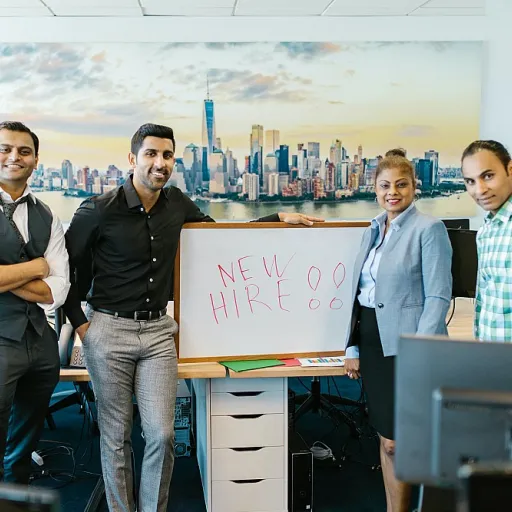
Understanding AI's Impact on Hiring
AI's Influence on the Hiring Landscape
Artificial intelligence (AI) fundamentally reshapes the hiring landscape, introducing new dynamics to the traditional recruitment process. In the realm of talent acquisition, AI offers a transformative ability to sift through large volumes of data, driving the recruitment process towards more data-driven outcomes. This integration of AI tools not only streamlines the act of finding top talent but also enhances the overall candidate experience.
Today's job market demands a faster and more efficient approach to recruiting. AI aids in automating repetitive tasks that once burdened human recruiters, leaving them with more time to focus on strategic decision making. For instance, AI can process job descriptions, widening the scope of potential candidates by identifying skills and qualifications that align with the open position effectively.
Additionally, technology drives efficiency in real time, offering insights and analytics that help hiring teams better understand which candidates are right for the job. This can improve hiring decisions substantially, allowing companies to identify and select potential candidates much quicker. AI can also assist in crafting more intelligent interview questions, enhancing the quality of real interviews and getting more out of the interview process. Enhancing efficiency with virtual assistants is one such initiative where AI is being instrumental.
However, integrating AI is not just about speeding up the process; it's about making the recruitment process more precise, quicker, and ultimately more rewarding for everyone involved. As AI continues to evolve, both candidates and recruiters will need to adapt and learn in order to fully harness the potential of this technology in hiring.
Benefits of Integrating AI in Recruitment
Efficiency with AI: Speeding Up Recruitment
Integrating artificial intelligence into the hiring process presents several advantages that can drive efficiency and improve outcomes for recruitment teams. By leveraging AI's capabilities, organizations can streamline operations and enhance decision-making, ultimately improving the experience for both candidates and hiring teams.
Streamlining the Recruitment Process
AI-powered tools have the potential to transform the recruitment process from start to finish. With AI, hiring managers can sift through vast amounts of data and job applications in real time, helping them to quickly identify top talent. The automation of repetitive tasks, such as resume screening and preliminary assessments, leaves human recruiters with more time to focus on engaging with candidates, conducting real interviews, and tailoring interview questions to better understand candidate suitability.
Enhancing Decision-Making
Data-driven insights are at the core of AI integration in recruitment. AI tools can analyze key metrics and candidate data to predict job performance and cultural fit. This helps hiring teams make faster, more informed hiring decisions. By leveraging AI, recruitment processes can be made more objective, reducing biases that can arise during the decision-making process. This aligns the search for top talent with strategic objectives and organizational needs.
Improving Candidate Experience
The integration of AI doesn't just serve hiring teams; it significantly benefits the candidate experience as well. Automated communication tools provide timely updates, and AI-driven systems can quickly address candidate inquiries. This added level of interaction fosters a sense of connection and engagement throughout the hiring process, ultimately attracting talent by demonstrating a commitment to innovation and efficiency.
Making the Most of AI Tools
Organizations looking to enhance their recruitment strategy should consider starting with a demo of AI-powered recruitment tools. These solutions can be tailored to specific needs, ensuring a personalized approach to enhancement. As AI technology advances, the tools available will continue to become more sophisticated, assisting businesses in staying ahead in the competitive field of talent acquisition.
Challenges and Ethical Considerations
Addressing the Challenges of AI in Hiring
Artificial intelligence is transforming the recruitment landscape, reshaping how hiring teams identify, evaluate, and acquire top talent. However, this transformation doesn't come without its challenges. There are important ethical considerations and logistical hurdles to address when integrating AI into the hiring process. One of the major concerns is the potential bias in AI-driven recruitment systems. AI tools rely heavily on data to help in making hiring decisions, and this data can inadvertently reflect existing human biases. This not only impacts the fairness of the hiring process but can also affect the diversity of the workforce. To mitigate this, it's crucial for organizations to be vigilant in how these systems are programmed and to continuously monitor their outcomes. Another challenge lies in the transparency and explainability of AI systems. Candidates expect clarity and fairness during real interviews, and any decision based on algorithmic outputs must be easily understood and justified. Ensuring a transparent recruitment process involves providing candidates with insights into how AI-based decisions are made, fostering trust, and improving the candidate experience. Moreover, the integration of AI tools in recruitment can lead to dependency on technology, where human recruiters might overlook their indispensable role. While AI excels in managing repetitive tasks and processing large volumes of data faster, human intervention is still essential for adding a personalized touch during interviews and understanding nuanced human emotions. Organizations also face logistical issues, such as the initial costs of adopting AI systems and the need to train staff in their use. These factors can present barriers to entry, especially for smaller companies. However, the long-term benefits in efficiency often outweigh these initial hurdles, streamlining the recruitment process and ultimately making it easier to find and hire the right candidates. Despite these challenges, AI continues to play a compelling role in the evolution of recruitment. By proceeding with caution, hiring teams can leverage these technologies responsibly to enhance talent acquisition strategies, such as how to effectively hire skilled Salesforce developers. With ethical considerations and proper safeguards in place, AI can serve as a potent ally in the quest to recruit top talent.AI Tools and Technologies in Recruitment
Exploring AI-driven Tools in Hiring
The integration of AI in recruitment processes has brought a slate of innovative tools that significantly streamline hiring and enhance the overall experience for candidates and hiring teams alike. These tools harness artificial intelligence to automate various aspects of recruitment and assist human recruiters in making quicker and more informed hiring decisions. AI-powered recruiting tools help sift through large volumes of data quickly, which not only shortens the recruitment process but also ensures that hiring decisions are based on a data-driven approach. This leads to the identification of top talent who are best suited for the job descriptions at hand. With these advanced tools, the initial phases of recruitment, like sourcing and screening candidates, become more about intelligent analysis and less about repetitive tasks. Furthermore, AI tools refine the interview process by providing insightful suggestions for interview questions tailored to the job description and the experience of each candidate. Thereby allowing recruiting teams to focus on real interviews that delve into a candidate's potential rather than general competence. The capabilities of AI-driven systems extend to monitoring the efficacy of recruitment processes in real time, offering actionable insights into the hiring process. To illustrate, AI can assist in predicting candidate success and cultural fit, and help craft engaging job descriptions that appeal to the right talent. These tools not only make it easier to hire faster, but they also enhance the candidate experience by ensuring a smoother interaction with human recruiters, from the first touchpoint to the final hiring decision. The increasing reliance on AI in recruitment doesn't eliminate the need for human judgment. Rather, it complements it—enhancing decision making by allowing teams to learn from past recruitment data and adjust their strategies accordingly. Start free of cumbersome manual processes with AI by requesting demos of the latest recruitment technologies, thereby giving your business a competitive edge in talent acquisition.Case Studies: AI in Action
Illustrative Examples of AI-Enhanced Recruitment
The integration of artificial intelligence in recruitment processes is continuously reshaping the landscape, enabling companies to make data-driven hiring decisions. Here are a few real-world examples that demonstrate how AI is actively transforming talent acquisition.- Streamlining Candidate Sourcing
Many organizations have adopted AI tools to sift through vast resumes and job applications. These tools help in identifying top talent by analyzing job descriptions, matching candidates based on skills, and even predicting candidates’ success throughout the hiring process. This not only makes the process faster but also enhances the candidate experience. - Elevating the Interview Process
AI-powered platforms are now being utilized to conduct initial interview rounds. These platforms can efficiently handle repetitive tasks, such as asking interview questions and evaluating responses. Human recruiters can then focus on real interviews where deeper insights into the candidates' experiences and perspectives are gathered. - Real-Time Data Analysis
Data-driven insights are invaluable in recruiting. AI provides real-time analytics that help hiring teams make informed decisions by understanding candidate behaviors, preferences, and the efficacy of job postings. This capability to work with hard data allows for more accurate hiring decisions and the continuous improvement of the recruitment process. - Optimizing Decision Making
AI’s role doesn’t stop after the hiring decision. These technologies continue to assist by predicting future performance and suggesting developmental plans for newly hired candidates, thus supporting both new hires and the organization.
Future Trends in AI and Hiring
Emerging Trends in AI-Driven Recruitment
The landscape of hiring is rapidly evolving with the integration of artificial intelligence, and the future holds even more transformative changes. As organizations continue to seek top talent, AI is set to play an increasingly pivotal role in the recruitment process.
Personalized Candidate Experiences
One of the most promising trends is the use of AI to create personalized candidate experiences. By analyzing data from previous interactions, AI can tailor communication and job descriptions to match the preferences and skills of potential candidates. This not only enhances the candidate experience but also increases the likelihood of attracting the right talent.
Real-Time Data and Decision Making
AI tools are becoming more sophisticated in providing real-time data that aids in faster and more informed hiring decisions. By leveraging data-driven insights, hiring teams can streamline the recruitment process, making it easier to identify and hire the best candidates. This shift towards data-driven decision making is transforming how companies approach talent acquisition.
Automation of Repetitive Tasks
The automation of repetitive tasks, such as screening resumes and scheduling interviews, is another trend that is gaining traction. By freeing up human recruiters from these time-consuming tasks, AI allows them to focus on more strategic aspects of recruitment, such as conducting real interviews and refining interview questions.
AI-Powered Interview Tools
AI-powered interview tools are also emerging as a key component of the hiring process. These tools can analyze candidate responses and provide insights into their suitability for a role. This not only helps in making faster hiring decisions but also ensures a more objective assessment of candidates.
Continuous Learning and Adaptation
As AI continues to evolve, it will learn and adapt to new recruitment challenges. This continuous learning process will enable AI to provide even more accurate and efficient solutions, ultimately making the recruitment process more effective and efficient.
In conclusion, the future of hiring is set to be increasingly AI-driven, with significant implications for how organizations attract, assess, and hire talent. As these technologies continue to develop, they will undoubtedly reshape the recruitment landscape, offering new opportunities and challenges for hiring teams worldwide.













